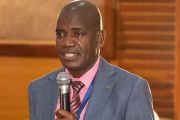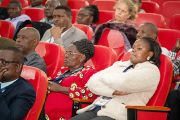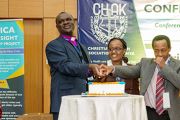Faith leaders meet President William Ruto on health and education
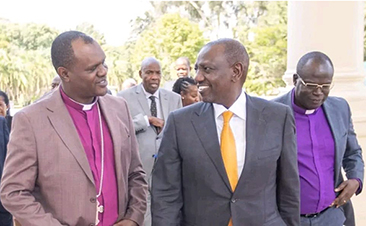
The government has pledged to work with religious institutions to deliver efficient and cost-effective health services as well as relevant education.
Speaking during a meeting with faith leaders at State House Nairobi, President William Ruto noted that religious institutions provide 40 per cent healthcare in Kenya and must be core in the Government plan and roll out of the Universal Health Care programme.
CHAK coordinated the successful partnership engagement with President Ruto during with education and health matters were discussed. A Memorandum on Health which highlighted areas of partnership strengthening and challenges that required Government support was presented.
The President, supported by CS Health, DG Health and Chairman of NHIF Board, responded to requests presented by the faith leaders. Education issues were responded to with the support of CS-Education.
Delayed NHIF payments and inadequate service package rates were top on the health agenda during the meeting with President Ruto. NHIF was represented by Chairman Eng. Michael Kamau and two Board members while MOH was represented by CS Susan Nakhuminchia, DGH Dr Patrick Amoth and DMS Dr Andrew Mulwa.
The MoU between Government (National/MOH and CoG/Counties) and the Kenya Faith Based Health Services Consortium (KFBHSC) will be updated to align to Government policies.
President Ruto commended religious organisations for their role in the provision of social services. He said the government appreciated their contribution to the provision of health and education and committed to continued partnership with them.
Encouraging male involvement in FP decisions
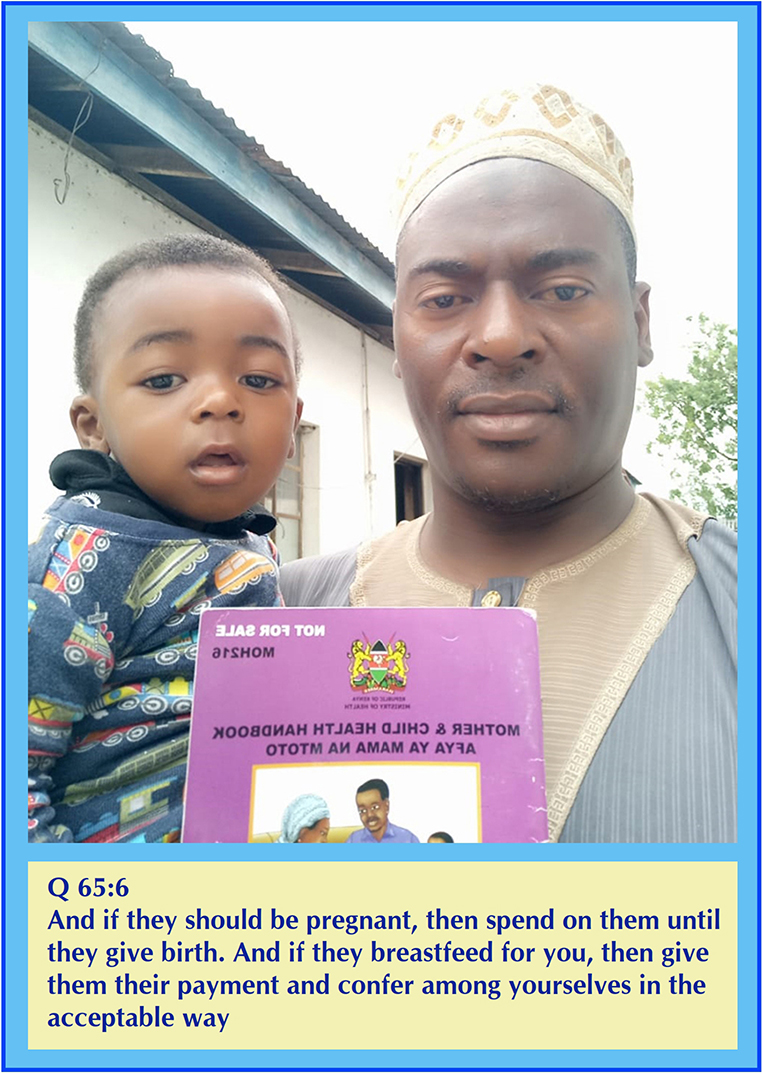
Family Planning (FP) has been defined as getting children by choice not chance. It involves making a conscious decision on family size and spacing between children. Studies show that male involvement positively influences continued use of family planning methods.
In Kenya, family planning is frequently perceived as a woman’s concern, and family planning programs most often target women. Yet men have greater decision-making power over household matters including health care due to gender dynamics.
Religious leaders have been identified as influential advocates for health as they are well trusted in the communities they serve and are able to reach the smallest family units and individuals. Equipped with appropriate messages and skills, religious leaders will not only empower their communities and congregations, leading to increased uptake of health services, including family planning, but are also able to advocate with policy makers and influence key decisions.
Ustadh Rashid Osman, a religious leader from Kilifi County, was one of the 54 faith leaders from six counties in Kenya trained in family planning, gender-based violence and HIV/AIDS advocacy through the Christian Advocacy for Family Planning in Africa (CAFPA) project.
The project, funded by the Bill & Melinda Gates Foundation through Christian Connections for International Health, engaged religious leaders to advocate for community and policy maker support for family planning, gender-based violence and HIV/AIDS to drive positive policy change. CHAK implemented the project from 2013 to 2021.
Ustadh Rashid says he started off as an ordinary Imam, completely unaware of the effects of gender-based violence, unplanned families and HIV/AIDS on his community. He however got involved in advocacy when he was selected as a family planning champion by the National Council for Population and Development, a government body.
In 2017, due to demand for reliable health information in his community, he thought of forming a CBO for Imams to discuss issues around reproductive health with regard to Islam. Muslim Intervention for Health Education (MIHE) has been instrumental in bringing health messages to the community.
The faith leaders’ training by the CAFPA project, gave Ustadh Rashid additional motivation to continue addressing reproductive health issues in his community. A key challenge for him, however, was getting men involved in FP and reproductive health decisions in their families. Whenever he called meetings to discuss FP and reproductive health only women showed up.
Meanwhile, Ustadh Rashid continued receiving invitations to seminars and workshops to discuss reproductive health issues in the Muslim community. He also continued attending capacity building sessions and holding community meetings in mosques. During the meetings held weekly, the community talked openly about the issues they were facing at home. It became apparent that women were suffering gender-based violence. Early pregnancy was a challenge among the youth that affected families and about which men as the family heads were very concerned. The community therefore began to actively seek solutions to these challenges.
To address the problem of male involvement, Ustadh Rashid began by speaking to men in the mosque where he served as Imam during Friday sermons and prayers. He told them that they were responsible for their households, according to Quran teachings, and needed to get involved in decisions affecting their families. After prayers, he asked the men to stay and discuss HIV/AIDS and teenage pregnancies. The men responded positively because these issues were affecting their households. During these discussions, he introduced family planning and gender-based violence which were regarded as taboo topics in the community.
Ustadh Rashid worked closely with health workers from local health facilities and other religious leaders in the CAFPA project to give the right information to his community. To reach even more mosque congregations in his locality, Ustadh Rashid structured Rabai Sub-County Imams, over who he is in charge, into four wards. He has continued to reach out to Imams in each ward with FP, HIV/AIDS and gender-based violence messages and tasks them with getting the information out to the men in their congregations. Each ward has between nine and 13 Imams. Initially, the Imams were against FP and needed to be convinced that it was allowed in Islam. Utadh Rashid held meetings with the Imams and their congregations, so the community could participate freely in the discussions.
He has also used mainstream media, mainly radio, as well as social media to advocate for FP, HIV/AIDS and gender-based violence. Through radio stations that target the Muslim community in Kilifi County, including Radio Rahma, Msenangu FM and Boss Radio, Ustadh Rashid has been able to pass FP, HIV/AIDS and gender-based violence messages and encourage men’s participation.
He has formed three WhatsApp groups, two targeting Imams and one targeting football coaches to act as advocacy platforms for the health issues affecting his community. Through the WhatsApp platform, Ustadh Rashid is able to address the Imams’ concerns and answer any questions they may have.
Additionally, Utadh Rashid has used Facebook Live, Facebook, Instagram and Twitter to engage his audience. His social media posts are taken positively by the younger audiences who follow him while FP concerns raised on these platforms are appropriately addressed.
Outcomes
Following the training by the CAFPA, Ustadh Rashid felt more empowered to speak about FP, HIV/AIDS and gender-based violence in his community. Additionally, by working closely with health workers from local facilities, he has also been able to reach youth and women in addition to the men.
The Imams working under him in Rabai County have been empowered to speak out on FP and reproductive health issues in their communities, including encouraging men’s participation in discussing and finding solutions to the challenges facing their families.
During the men’s meetings held after Friday prayers, the men agreed that FP was getting the number of children one could comfortably bring up. Further, it was agreed that according to Quran teachings, a woman needed two years to breastfeed a child while couples were advised to take an additional year to attempt conception. This added up to child spacing of three years, removing the idea that FP was not accepted in Islam.
The big question then became which FP methods were allowed in Islam apart from breastfeeding. This opened the door for discussions and it was agreed that non-permanent methods were allowed and acceptable. This view is backed by Muslim scholars whose studies and writings Ustadh Rashid constantly refers to in his teachings, in addition to supporting Quran text.
Why mission hospitals need more support to effectively complement the fight against COVID-19
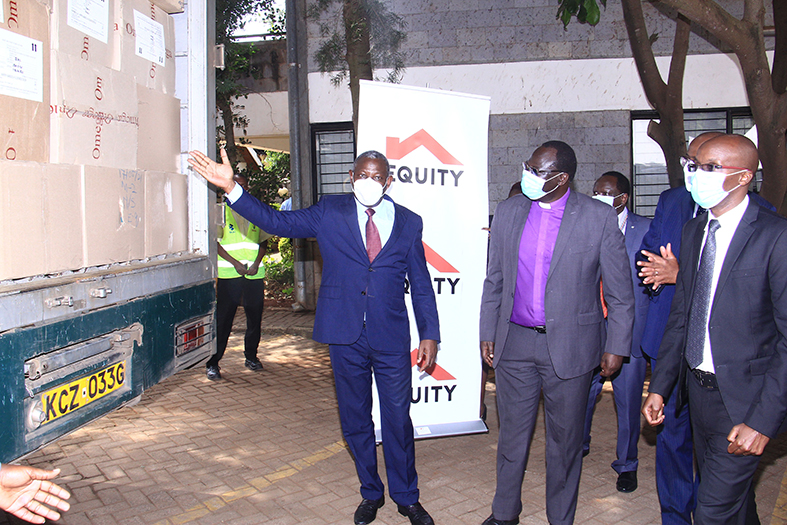
Before Kenya recorded its first case of COVID -19 infection in March 2020, we had already witnessed how the global pandemic had seriously hit countries with even more robust healthcare systems.
If there was one thing that this pandemic taught us from the onset, it was that fighting this virus was not going to be a government and health workers–only affair. Globally, citizens were already acknowledging the difficult conditions in which frontline workers were battling to save lives.
We saw people lining up the streets in these cities every evening as the day’s shift came to a close. Clapping, hooting and waving as they showed appreciation to the brave healthcare workers who were at the frontlines of the fight against the pandemic. Other than reminding us about the values of humanity, these scenes served to hint to us that to win against this virus, we all had a role to play.
As we got to July 2020 and were approaching the peak of the first wave in Kenya, the country’s healthcare system started to feel the brunt of the pandemic. Limited isolation spaces in government facilities, high cost of care in private facilities, which made them inaccessible to their regular clientele, and a sharp shortage of PPE and other medical equipment threatened the country’s efforts to contain the spread of the virus.This pandemic brought to fore the need for government, private and faith-based healthcare providers to work together to manage the infection numbers.
Mission hospitals have over the years supplemented the country’s public healthcare system through the provision of quality and affordable health services.
During this unprecedented times, these faith-based facilities have proven to be an integral part of the National and County COVID-19 pandemic emergency response infrastructure. They have set aside isolation wards, ICU beds, oxygen treatment support facilities, trained staff and have established protocols for COVID-19 screening, treatment, infection prevention and control.
This has escalated the mission hospitals’ need for PPEs for frontline staff, and other medical equipment.
The current high cost of PPEs and other associated medical consumables not only makes it difficult for mission hospitals to care for COVID-19 patients, but also challenging for them to provide their other patients with the care they need in a safe environment. A majority of these facilities are located outside Nairobi and some of them, like Kijabe, Chogoria, Kikuyu and Tenwek Mission Hospitals, provide highly specialized care to patients who cannot afford to seek treatment in private health facilities because of prohibitive costs.
Unlike government health facilities which are funded by the exchequer and private hospitals, which operate on a business model, mission hospitals are essentially run as charitable institutions inspired by faith foundation and commitment to compassionate service relying on donations and the heavily subsidised fees that they charge their patients. On many occasions, these health facilities have to waive fees for the vulnerable, needy, and very poor patients.
It is for this reason that we are grateful for the donation of PPE kits worth KES 33 million made by Equity Group Foundation (EGF) and the Kenya COVID-19 Fund Board to support mission hospitals with active COVID-19 isolation units. Such donations allow us to continue offering compassionate care to all our patients at affordable costs.
While in the last few weeks we have noted a decline in COVID- 19 case positivity rates, we are not yet out of the woods. To date the country has recorded over 240,000 confirmed infections for those tested and unfortunately we have lost over 5,000 lives . Recently, while addressing the nation as the government reviewed containment measures, Health CS Mutahi Kagwe warned that Nairobi had run out of beds for COVID-19 patients. COVID-19 truly brought a strain on the health system.
With treatment and isolation spaces in public hospitals dwindling in the wake of this surge, and costs keeping many away from private facilities, mission hospitals are more likely to take on even higher numbers of new COVID-19 patients in need of hospital admission. Already, a majority of mission hospitals have designated isolation areas and units set aside to manage COVID -19.
While the donation from Equity and the Kenya COVID-19 Fund Board has gone a long way in plugging the shortfalls in the mission hospitals, we are still far off from being sufficiently equipped to handle the looming surge. This is an opportunity for more Kenyan corporates to come on board and provide the much-needed support to strengthen hospitals infrastructure and capacity for response at this critical time.
Authored by Dr. Samuel Mwenda, General Secretary, CHAK.
Mission hospitals receive PPE donation
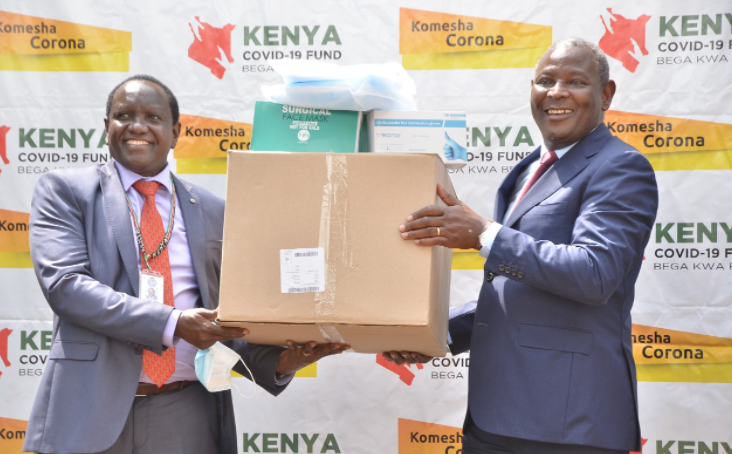
Nyanchwa SDA Hospital is the latest CHAK member facility to benefit from a donation of Personal Protective Equipment (PPE) from Equity Group Foundation and the Kenya COVID-19 Fund Board. The CHAK member health facility which is located in Kisii County joins other mission hospitals who have benefited from PPE donations by Equity Foundation and the COVID-19 fund worth Ksh33 million.
The donations have benefitted 25 mission hospitals affiliated to CHAK and the Kenya Conference of Catholic Bishops (KCCB) and spread across various counties in Kenya. The PPEs include 750 protective goggles, 25,000 disposable gowns, 500,000 nitrile gloves, 500,000 surgical masks, 750 face shields, 12,500 disposable scrubs, 25,000 head covers, 5,000 coveralls and 50,000 KN95 respirator masks.
Speaking during the official PPE handover ceremony held at CHAK offices earlier in the year, Equity Group Managing Director and CEO, Dr James Mwangi, said the Equity foundation and COVID-19 Fund Board recognized the role played by mission hospitals in the fight against COVID-19 and in contributing to accessible and affordable health care in the country.
“Through KCCB and CHAK, we received a request to support 60 mission hospitals across Kenya. As EGF and the COVID-19 Fund Board, we have saw it prudent to make an initial donation to those mission facilities with active COVID-19 isolation units that are currently managing the care of admitted patients”, said Dr Mwangi.
Speaking during the event, CHAK Chairman Rev. Dr. Robert Lang’at noted that despite the major role played by the faith-based hospitals in the fight against the pandemic, they were faced with PPE shortages due to financial challenges.
“As CHAK, we are privileged to have a presence through our member mission hospitals in 45 out of the 47 counties. The provision of PPEs by Equity Group Foundation and the Kenya COVID-19 Fund Board will play a huge role in safeguarding the lives of our frontline healthcare workers. Faith based mission hospitals have proven to be critical in the country’s COVID-19 response and the PPEs issued today will help us leverage on the unique strengths of the faith community to mitigate the effects of the pandemic,” said Dr Lang’at.
Another 35 mission health facilities will benefit from an additional consignment of PPEs when their COVID-19 inpatient isolation and management units are active.
The benefitting health facilities have established Hospital Liaison Committees to support management of PPEs. They committees are mandated to receive, distribute, oversee proper usage and re-order to ensure consistent supply of the PPEs to the health care workers. The Liaison Committees for each hospital comprises nominated representatives from Equity; and Healthcare worker representatives, a medical doctor, a clinical officer and a nurse who are members of their professional associations, together with the hospital’s stores in-charge.
The distribution of locally manufactured PPEs is an initiative of Equity Group Foundation and the Kenya COVID-19 Fund Board as part of a coordinated effort to support frontline healthcare workers through the provision of PPEs.
Speaking at the event, CHAK chairman REV.Dr. Robert Lang ‘at stated that the covid -19 pandemic had created a tough time for people. He noted that faith based hospitals have been on the frontline providing routine health services, while managing covid-19. Despite the major role played by the faith based hospitals in the fight against this pandemic, the hospitals have faced a major challenge of accessing adequate PPEs and financing due to the hard economic challenges.
Equity Group Managing Director and CEO,Dr James Mwangi Said ,out of 32 level 4&5 hospitals recommended for support, Equity Group Foundation had agreed to support them in 3 phases, priority being given to the first 10 hospitals, which are already providing treatment services to covid -19 patients. He also added that the second phase distribution would focus on the remaining 35 mission health facilities, which will benefit from an additional consignment of PPEs when the covid -19 inpatient isolation and management units are actively in use.KCCB Chairman Rt.Rev.Joseph Mbatia acknowledged the efforts made by the Equity group foundation and The Kenya covid -19 fund board, pointing out that the donation will go a long way in protecting our health workers and trickle down to benefit communities at the grassroot level.
The PPEs donated include;750 protective goggles,25,000 disposable gowns, 500,000 nitrile gloves,500,000 surgical masks,750 face shields,12,500 disposable scrubs,25,000 headcovers,5,000 coveralls and 50,000 KN95 respirator masks. Faith based hospitals have continued to complement the government response to covid-19 and have been receiving and managing covid -19 patients, with moderate to severe illness. The hospitals have also set aside isolation wards,ICU beds, oxygen treatment support facilities, trained staff and also established protocol for covid-19 screening,treatment,infection prevention and control. This has resulted to the dire need of PPEs for the protection of frontline staff
The burden of covid -19 pandemic continues to grow in Kenya. As at 16th June 2021,the country had recorded 176,622 cases, with 3,428 deaths and 97% of the cases were from local transmission across all the counties. A total of 5369 health workers have been infected, and 40 deaths reported. This includes those from faith based organizations.
The private sector initiative has led the way in providing PPEs for health workers and in promoting local production, which has drastically reduced the cost of PPEs and increased access. The covid-19 fund board and Equity Group Foundation have done exemplary well in leading the covid-19 response in the country. The donations will help a large population of Kenyans who rely on mission hospitals for healthcare services, as well as protect our frontline health workers who serve selflessly.
The event provided a great platform for CHAK member networks and The Equity Group Foundation to build a long-term relationship, and most importantly collaborate in patient referrals and health workers training.
Focus on CHAK Annual Health Conference 2021

Focus on CHAK Annual Health Conference 2021
The CHAK Annual Health Conference 2021 was successfully held on April 27 and 28, 2021. This was the first time in the history of CHAK that the event has been held virtually. Participants at the event were drawn from CHAK member health units, stakeholders, partners and other Africa Christian Health Associations.
With the theme ‘COVID-19 Pandemic; building resilience for Faith Based Health Services’, the conference focused on developments in the COVID-19 pandemic in Kenya, role of faith-based health services and facility-based management of the illness.
CHAK Chairman Rt. Rev. Dr. Robert Lang’at set the mood for the conference by delivering the opening devotion focusing on the power of innovation. Basing the opening devotion on Isaiah 63:15-19, Rt. Rev. Dr. Lang’at that every sector, including health care and the Church, had been greatly affected by the COVID-19 pandemic. Pandemics witnessed over the years had killed millions and destroyed civilisations. The Chairman challenged CHAK member health units to ensure the facilities were not made dinosaurs by the pandemic. “We need to pray to God for innovative ideas in the pandemic,” noted Dr. Lang’at.
The virtual CHAK Annual Health Conference, he noted, was an example of innovation. Dr. Lang’at further challenged the CHAK member health units to use the lessons learned during the COVID-19 pandemic to innovate solutions to various challenges.

Vaccination
Dr. Willis Akhwale, Chairman, COVID-19 Vaccine Deployment Taskforce, gave an overview of the programme roll out and progress. Dr. Akhwale also spoke to the CHAK Annual Health Participants on the emerging issues, planned monitoring and improvements to the vaccine roll out programme. He observed that a third of the COVID-19 vaccinations done country-wide were in Nairobi County with people above 58 years recording the highest number of doses received. A key discussion point during the session was the role of faith-based health facilities in the vaccination exercise. Dr. Akhwale noted that faith-based health facilities were key allies to the Government in health service provision and would be tasked with vaccinating the population during the second phase of the exercise, working side by side with county health facilities. Concerns on the side effects of COVID-19 vaccines, availability of the second dose of the Astra Zeneca Vaccine for people who have already been given the first dose, level of protection offered by the vaccine and possibility of people making a choice between vaccine brands were also raised by the conference participants.
Infection Prevention and Control
Speaking on infection prevention and control in a hospital setting, Dr Duncan Nyukuri noted that health facilities were ideal settings for COVID-19 transmission and took participants through the hierarchy of IPC controls. Discussions during the infection prevention session centred on transmission, referral, testing and handling the deceased.
COVID-19 messages of hope and the role of the faith community
Dr. Catherine Njigua, CHAP Uzima Project Director, spoke on the interfaith COVID-19 response, an initiative leveraging on the unique strengths of the faith community to mitigate the effects of COVID-19. The initiative focuses on:
- Promoting behaviour change towards risk reduction
- Dissemination of correct and updated COVID-19 messaging to the community
- Addressing some of the untoward effects of COVID-19 containment measures
- Complement the efforts of the Government in COVID-19 mitigation and promotion of overall well-being for all.
The initiative has actively disseminated seven key messages of hope as follows:
- Life – not death
- Hope – not fear
- Connection – not isolation
- Positive role model
- Caring – safely
- Celebration – not stigma
- Influence – builds hope, gratitude, compassion
COVID-19 management at facility level
Dr. Douglas Gaitho from Aga Khan University Hospital delivered an insightful presentation on management of COVID-19 at health facility level. Key areas covered in the presentation were:
- Transmission and symptoms including stages of COVID-19 infection and most common symptoms as well as severity classification.
- Diagnosis and investigations including testing, laboratory and other investigations
- Therapies including care of pregnant women
- Deisolation
The presentation also covered the progress of COVID-19 management through the first second and third waves of the disease.
Lessons from CHAK member health units
AGC Tenwek and PCEA Chogoria hospitals were able to share their experiences with managing COVID-19 patients.
Focusing on the conference theme of ‘resilience’ and adding ‘hope’ in the drawn-out war against the pandemic, Tenwek Hospital gave a presentation on efforts by the institution to care for thousands of COVID-19 patients while continuing to offer services in other disease areas. Departments and individuals in the institution contributed their talents and strengths towards fighting the pandemic. Allowing only one visitor per patient, COVID-19 screening through temperature checks on entry, handwashing and sanitizing, observing social distancing at all points and appropriate messaging were some of the measures undertaken by the hospital in the fight against the pandemic.
Among the challenges that the hospital has experienced in the fight against the pandemic are:
- Fear
- Staff infections
- Fatigue due to mask wearing, social distancing and travel restrictions
- Wait and see attitude of the staff towards the vaccine
However, staff have now accepted the vaccine and many of them have received the injection. They have proceeded to serve tirelessly, competently and courageously in efforts to defeat the virus.
Conclusion
The CHAK Annual Health Conference 2021 offered a rich learning experience for CHAK member health facilities as the world at large and Kenya in particular continues to grapple with the COVID-19 pandemic. Being the first virtual annual health conference for CHAK, the forum is an example of the ‘new normal’ each of us has had to grapple with since the advent of the pandemic in early 2020 and the importance of innovation and resilience, two subjects covered at length in the forum, in overcoming the challenges associated with the disease.
Equipping CHAK health facilities for the fight against the COVID-19 pandemic

Despite a seemingly flattening COVID-19 curve by the end of February 2021, the Government has continued to announce a daily increase in the number of infections and deaths.
CHAK member health units have responded to the challenge of COVID-19 by taking various measures including establishment of isolation centres, well-equipped COVID-19 wards with oxygen supply, community sensitization, seeking support from different partners, among others.
It is against this backdrop that CHAK re-doubled its efforts to build the capacity of its member units to deal with the pandemic, reaching over 450 of the health facilities under its umbrella with these efforts.
Read more: Equipping CHAK health facilities for the fight against the COVID-19 pandemic
CHAK, Muranga County collaboration births first FP CIP in central region

Murang’a County has launched its first Family Planning Costed Implementation Plan (FP CIP). The plan which will run from 2021-2015 was launched on December 14, 2020, in an event presided over by the Deputy Governor Hon. Maina Kamau and attended by the county health team led by CEC Health Hon. Joseph Mbai.
The CHAK team at the event was led by General Secretary Dr. Samuel Mwenda. The Murang’a County Family Planning Costed Implementation Plan has been developed with support from the CHAK CAPFA project with funding from Christian Connections for International Health.
Read more: CHAK, Muranga County collaboration births first FP CIP in central region
Page 2 of 2









